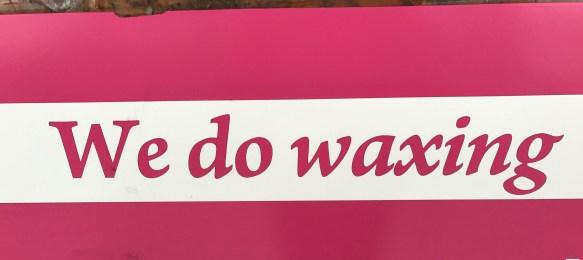Maybe it’s the spirit of rebellion inspired by the approach of Bastille Day, but I have to ask: Why do we need apostrophes? Perfectly respectable languages — French and Spanish come to mind — manage without them. Does anybody really think that writing “Georges flag” instead of “George’s flag” will mislead a reader? Unfortunately, abolishing apostrophes is not an option I can exercise unilaterally. And while they remain part of the language, I do think they should be used correctly. Often, they aren’t:

In this sign “sheets” is a plural, not a possessive. Therefore, this apostrophe isn’t okay. (Neither were the sheets, which looked a bit faded.) Maybe I should have razored out the apostrophe from that sign and inserted it into this one:

Sorry for the blurry photo; a grate, a screen, and a window blocked me, perhaps an unsuccessful attempt to mask a punctuation problem. The space between the N and the S implies that the sign writer had an inkling that “men s” was a possessive requiring an apostrophe, not a plural to be written without one. Yet somehow the punctuation never made it onto the sign. Nor is it clear what “men s wanted current designers” means. But that’s not an apostrophe issue. “Men’s wanted current designers” is just as confusing.
Here’s a fine pair, from two different stores. Care to guess which is correct?


I vote for the second, reluctantly. In the first, “dine” isn’t a noun. The hot dog and fries could be a “kid’s dinner,” or “kids’ dinners,” if they don’t eat much. But something has to change (both grammatically and nutritionally). The case for the second sign is that “kids” functions as an adjective. Despite watching the “Yankees game” instead of “the Yankees’ game,” I prefer “kids’ classes.” Also a hyphen in “pizza-making.” Nobody ever said I wasn’t picky. Just willing to guillotine apostrophes out of the language.









 If they’re “certified,” they can’t be that bad, right? Don’t ask me what they’re “certified” in (or “of,” as the sign says). At least they’re in NY — well, make that “Ny,” but nothing’s perfect. Not even verbals.
If they’re “certified,” they can’t be that bad, right? Don’t ask me what they’re “certified” in (or “of,” as the sign says). At least they’re in NY — well, make that “Ny,” but nothing’s perfect. Not even verbals.



 Surely you weren’t planning on ushering guests into a room with a naked table! A four-legged pair of jeans would do nicely for a hip, can’t-be-bothered-to-dress-up dinette set. An evening gown with a very wide skirt saves formal hosts from the embarrassment of an underdressed eating surface. No hint from the shopkeeper about what sort of “table clothes” are available. If the customer isn’t pleased with the styles on sale, “sheets” could possibly preserve the table’s modesty.
Surely you weren’t planning on ushering guests into a room with a naked table! A four-legged pair of jeans would do nicely for a hip, can’t-be-bothered-to-dress-up dinette set. An evening gown with a very wide skirt saves formal hosts from the embarrassment of an underdressed eating surface. No hint from the shopkeeper about what sort of “table clothes” are available. If the customer isn’t pleased with the styles on sale, “sheets” could possibly preserve the table’s modesty.

 The bullet point in front of “house” was odd because there were no other items on the sign, hence no bulleted list. But if I’m opting to tinker with punctuation, I’m going for a comma after “house.” That comma would create a direct address statement appropriate to this holiday season: “House, hold items [so I don’t have to].” See? Shopping-stress relief!
The bullet point in front of “house” was odd because there were no other items on the sign, hence no bulleted list. But if I’m opting to tinker with punctuation, I’m going for a comma after “house.” That comma would create a direct address statement appropriate to this holiday season: “House, hold items [so I don’t have to].” See? Shopping-stress relief!



 Unanswered Question: What happened to the candlestick maker?
Unanswered Question: What happened to the candlestick maker?
 In my ignorance I was ready to impose an “unauthorized part of speech” penalty — until I looked up “creative” in the dictionary, which enlightened me to the fact that “creative” can be a noun applied to people who, well, create for a living: writers, artists, composers, and so forth. Apparently I’ve been a “creative” for decades and never knew it.
In my ignorance I was ready to impose an “unauthorized part of speech” penalty — until I looked up “creative” in the dictionary, which enlightened me to the fact that “creative” can be a noun applied to people who, well, create for a living: writers, artists, composers, and so forth. Apparently I’ve been a “creative” for decades and never knew it.








